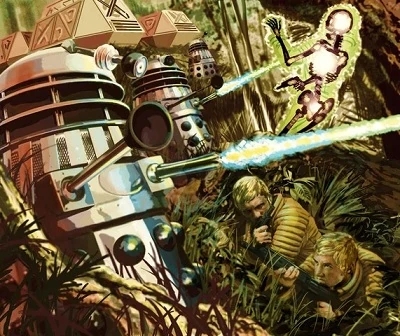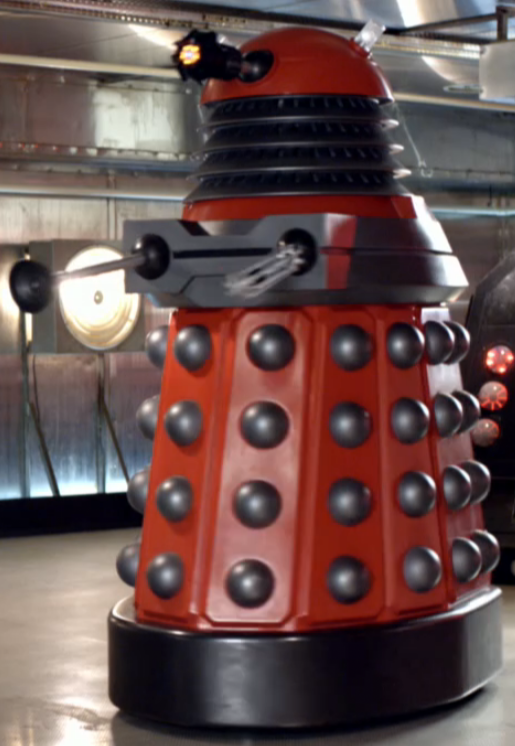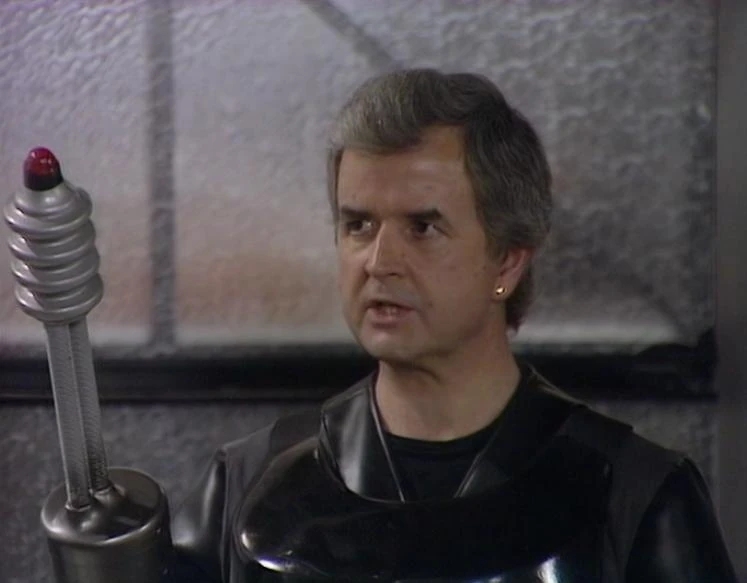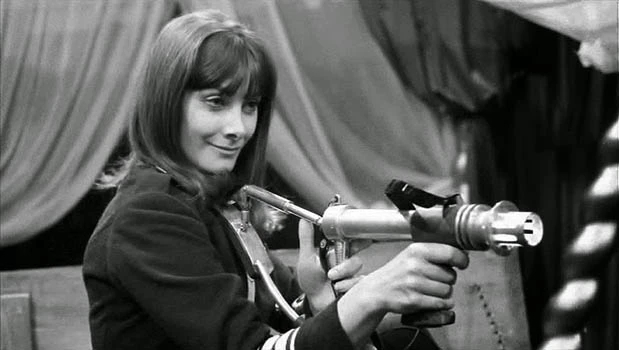
Hello, and welcome back to the Big Who Listen, where we’re hoping Big Finish have produced a brain un-scrambling audio to counteract the effects of this one…
These discussion posts are better suited to those who have already listened to the stories we’re discussing. If you haven’t listened yet, Brotherhood of the Daleks is available to download for £7.99 here.
WARNING: HERE THERE BE SPOILERS
The Big Lie
Adam: Looking over our reviews, it seems that most of us were pretty positive about Brotherhood of the Daleks! However, I’m more ambivalent about it, partly because of the overstuffed narrative, but also because it repeatedly pretends that Charley and the Doctor’s friendship is about to pass an event horizon, only to suddenly withdraw the rug and put everything to how it was before the adventure started. If this had been the audio where the Doctor learnt about Charley’s past and had to deal with the knowledge that their travels put the Web of Time in jeopardy, I would probably be far more keen about it. Instead, we’re likely to have more audios of Charley badly pretending to not know the Doctor, who is far too smart to have not already worked it out by now. Was anyone else frustrated by how often this audio teased us with Charley telling the Doctor the truth, but then immediately swerved away from actually doing so? I was actually quite annoyed when they revealed that the “Doctor” which Charley finally confessed to was actually a replicant, and I think it might have ultimately soured the audio for me.
Giles: So personally – it doesn’t bother me for a couple of reasons. First off this story is such a ride that I’m having too much fun with the mind games anyway to let this stop my enjoyment’s momentum and secondly, in hindsight I know how this arc goes and how it ends, this is my third time listening to Brotherhood alone and knowing that, yes it doesn’t do as much as it could have, but it doesn’t dent the experience because the whole arc stands strong and the tension is still there while Eight and Charley just dragged and dragged until the writers had enough. I don’t sense exhaustion from the writers here, just a willingness to hold their cards back for a little longer.
Adam: Doesn’t that mean that this audio is less important to Charley and the Sixth Doctor’s arc, considering that it doesn’t really change the status quo?
Giles: Yes the status quo has not really changed, did I need it to given everything else this story pulled off? Absolutely not. It’s entertaining enough for me to forgive its teasing habits. Plus it’s not as though nothing has changed, Charley trusts this Doctor enough to tell him down the line and their friendship feels stronger after bonding over bonkers Daleks.
The Dalek Manifesto

Adam: We should probably talk about the politics of this audio, and specifically the inclusion of Communist ideology. Both John and Sam interpreted the audio as having the subtext of “Communism is doomed to fail”, while my review suggests that it’s alluding to horseshoe theory – the incredibly simplistic assertion that the far-left and far-right have more things in common than differences. After all, the epilogue reveals that Bolshevik Daleks ultimately aren’t that different to the ones from Skaro. We can also consider how Brotherhood of the Daleks was recorded in June 2008, which predates the collapse of the global financial system that September, let alone a decade of austerity that led to renewed interest in Marxism and broader disillusionment with capitalism, with these ideas being spread through social media (still in its infancy at the time). In other words, the audio’s sceptical attitude towards Communism is largely a product of its time.
Sam: To be fair, I think it’s maybe slightly unclear whether this audio is arguing “Communism in general is doomed to fail” or “the attempt to apply Communism to the Daleks is doomed, because Daleks are incapable of change”. I feel you could argue a case for either interpretation. It’s perhaps worth noting that when Charley talks critically about Communism, the Doctor does advise her that “you don’t judge an idea by its misinterpretations”. And Charley’s negative opinion of Communism makes sense for somebody of her time period and social class – paranoia about “Bolshevik” conspiracies was common in the early 20th century. (For example, I recently re-read a 1930s detective novel where the murder is initially speculated to be a Bolshevik plot, although that turns out not to be the case).
Adam: Brotherhood of the Daleks is perhaps the audio which most strongly characterises Charley as somebody from the 1910s. There’s a lot of old-fashioned terminology in her vocabulary, such as when she refers to “Deepest Africa”, “Darkest Peru” or “the Orient”, and how she uses the pronoun “whom”. She invokes the imagery of explorers wearing pith helmets, suggests that one of the Thals is suffering from shell shock (with the Doctor correcting her to PTSD), and describes the Doctor as dressed as an Eskimo when he’s wearing Inuit garb. She even describes herself as being “splotted” when her leg gets sprayed on by a plant.
Liar Liar

Adam: There’s something about Charley that bothers me in this audio: how come she’s such a bad liar when she’s hiding her previous travels with the Eighth Doctor, yet when she’s pretending to be a replicant, her performance is impeccable? I know that this is because the listeners are supposed to think that she might have been a replicant all along, possibly even from her first appearance in Storm Warning, but it doesn’t feel right that sometimes it’s very obvious that she’s hiding information from the Doctor, and in Part Four, she suddenly becomes really good at making stuff up on the spot.
Sam: Honestly, this didn’t really bother me, though you’re right that it seems a bit inconsistent. I suppose if you wanted to rationalise it, you could argue that what Charley is doing with the Daleks is improvising a short-term story to buy herself time, which in a way is easier than what she’s having to do with Six, which is to try and come up with a plausible cover story and stick to it over a long period of time? It probably doesn’t help that a lot of the times she slips up with the Doctor are because of things she does out of sheer habit (knowing what the TARDIS controls do, casually referencing the Web of Time).
Giles: Presumably because she has a lot of emotion tied with her time with Eight, a lot of which is likely unresolved trauma thinking he is dead, whereas being a Dalek replicant is effectively pretending to be unemotionally evil, which is a less complicated persona to improvise on the spot.
Post-Credits and Post-Post-Credits
Sam: I was wondering what other people thought of the post-credits epilogue, in which the Daleks seemingly revert to evil, forcing Jesic to destroy the planet. While I didn’t necessarily mind this epilogue, I think part of me would have preferred it if the story had ended on a more ambiguous note, rather than seemingly confirming the Doctor’s cynical belief that the Daleks can never change. Does anybody else agree or disagree?
Adam: I agree, it reminds me of the dour ending of The Zygon Who Fell To Earth where Trevor renounces his race and declares that the Zygons deserve to go extinct, essentially vindicating the Doctor’s earlier cynicism. Ultimately, this audio was still a few years away from Into The Dalek, with Rusty and Clara challenging the Twelfth Doctor’s belief that there can be no such thing as a “good” Dalek.

Adam: As has been the case for the last few releases, the CD Extras for Brotherhood of the Daleks are worth listening to. * If you felt that the story was pretty convoluted and confusing, you’re in good company because it seems the cast had a lot of difficulty keeping track of what was going on at any given moment. * Alan Barnes talks about an earlier version of this audio called “Kingdom of the Daleks”, which would have been a follow-up to The Daleks’ Master Plan with Sara Kingdom’s parents adopting some abandoned Daleks and raising them as proxy children. He also took inspiration from Jacob’s Ladder (1990), a psychological horror film about Vietnam War veterans having hallucinations of their own future. * India Fisher requested a retake of the crucial scene where Charley confesses to the replicant Doctor and she was allowed to tweak her dialogue with Alan’s blessing. The original take is included in the final track.

NEXT TIME: The 7th Doctor, Ace and Hex celebrate forty-five years of Doctor Who with an anthology of adventures…
